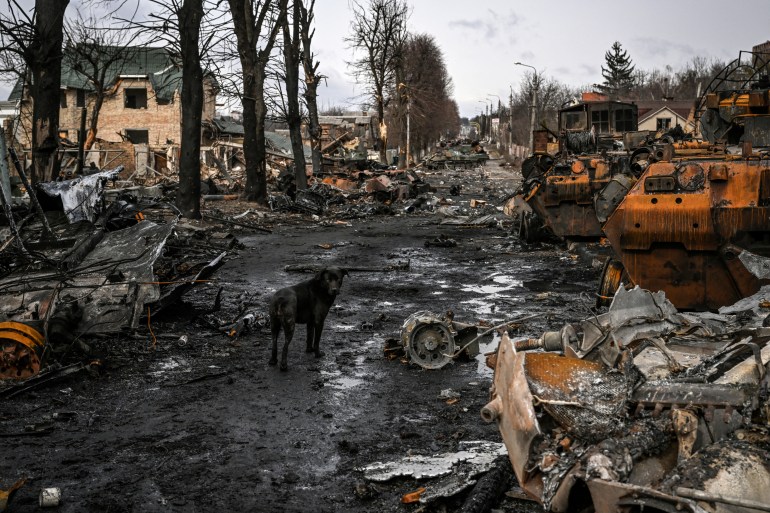Russia x Ukraine: Ukrainian President Volodymyr Zelensky met with residents in Bucha on Monday and accused Russia of 'genocide' and 'war crimes' in the death of civilians and other alleged atrocities there.
Ukrainian President Volodymyr Zelensky just made his most sweeping accusation against Russia yet. During a Sunday morning interview with CBS’ Face the Nation, Zelensky denounced Russia for committing genocide.
Ukrainian President Volodymyr Zelensky on Monday visited the town of Bucha, where Ukraine has accused Russian forces of committing war crimes, telling reporters there "we want you to show the world what happened here," CNN reported.
Driving the news: As Ukrainian forces retook the Kyiv region and other areas over the weekend, officials and independent photographers reported bodies of civilians — some with their hands tied behind their backs — strewn in the streets of the city of Bucha.
“We are the citizens of Ukraine and we don’t want to be subdued to the policy of [the] Russian Federation
This is the reason we are being destroyed and exterminated,” Zelensky said through a translator.
He also pointed to reports of civilian massacres on the outskirts of Kyiv, and shared images of what appeared to be at least one mass grave and bodies covering the streets.
We break down these gruesome findings and how they are sparking new calls for an investigation into Russia’s invasion of Ukraine.
Zelensky’s visit to Bucha is his latest effort to bring international attention to Ukraine: He delivered a chilling video message during Sunday’s Grammy Awards and accused Russian forces of committing genocide against the Ukrainian people during a Sunday appearance on CBS.
Russia has been accused of war crimes in Bucha, near Kyiv [Aris Messinis/AFP] (AFP)Vinnytsia, Ukraine – “They were shelling all the time, around the clock, and all the shells flew over my house,” Oleh Matsenko, who survived 33 days of Russian attacks in Bucha, a once-tranquil town northwest of Kyiv, told Al Jazeera. Speaking four days after Russian troops retreated, he said he was particularly frightened when a column of dozens of tanks and armoured vehicles slowly drove by – surrounded by infantrymen peeking into the doors and windows of the houses on his street.
“The column was so big that it took them about two hours to drive past my house,” he said. Going out for food was a gamble, he said.
Some of his neighbours left their dark, cold houses that had no electricity, running water or natural gas supply to get bread or charge their mobile phones – but never came back. One day, he went to a market that survived the shelling to get food for himself and several friends and neighbours who flocked to his house, which was warmed by a wooden stove.
And he saw bodies – mostly civilians shot dead by Russian troops. “I saw it all, the piles of corpses in the streets, all dead. I saw it all, they are still lying there, not everyone was collected,” Matsenko said.

